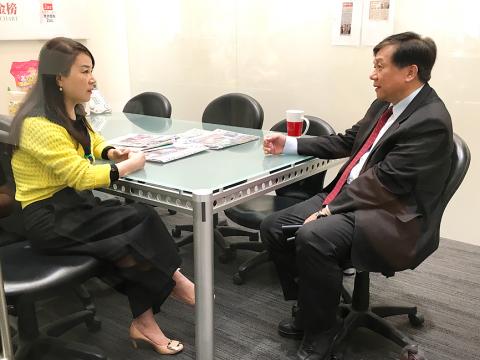Minister of economic affairs-
designate Lee Chih-kung (李世光) yesterday compared the impact of the OBI Pharma Inc (台灣浩鼎) controversy on the nation’s biotechnology industry to a “tsunami.”
OBI Pharma “definitely has an influence” on the biotech industry, Lee said during an interview with radio host Clara Chou (周玉蔻).

Photo: Huang Pei-chun, Taipei Times
“The impact looks like the beginning of a tsunami,” he added.
Lee said it was hard to say how long it would take for the industry to recover from the scandal, sparked by allegations of insider trading and conflict of interest at OBI Pharma, adding that it would depend on public sentiment.
Most developed countries value the biotech industry and understand that it requires long-term investment, he said.
“I am not trying to speak for OBI Pharma. The insider trading and conflict of interest allegations are indeed significant issues, but I think the public should seek the truth and look at the matter rationally,” Lee told reporters after the interview.
Lee declined to comment on Academia Sinica President Wong Chi-huey’s (翁啟惠) role in the case, saying that Wong should explain the matter to the public.
Wong is an internationally renowned academic, Lee said, adding that he does not think Wong’s involvement in the controversy is a “shame.”
However, the scandal and its effect on the public have affected the reputation of Academia Sinica, he said.
Local media reports have also revealed that Lee’s younger brother, Howard Lee (李世仁), is an independent board member of OBI Pharma and a member of Academia Sinica’s research and development results management committee — sparking a new round of speculation about conflict of interest.
C.K. Lee said that his brother’s situation cannot be classified as a conflict of interest, because the committee does not deal with individual companies.
Moreover, his brother does not receive remuneration as committee member, only a transportation allowance of NT$1,000 to NT$2,000 each time, C.K. Lee said.
However, he has asked his brother to consider resigning from OBI Pharma and the committee given his ministry post.
C.K. Lee also confirmed that he has dual citizenship, but said he had submitted an application to the American Institute in Taiwan (AIT) to give up his US citizenship, with an interview scheduled next week.
C.K. Lee, who is to take up his new post on May 20, is to visit Minister of Economic Affairs John Deng (鄧振中) on Monday to talk about the handover, the ministry said.
The 56-year-old said his biggest challenges in his new post would be finding ways to boost economic development, increase wages for young people and attract international talent to Taiwan.
His first task when he assumes office will be to promote development of the green energy sector in Taiwan in the hope of building a demand-oriented industry as soon as possible, Lee said.
He said he will also push for reform of the industrial sector, which has complained of water, electricity, land, and labor shortages.
Lee said he was made aware of the problems during his tour on April 28 of various industrial and commercial enterprises, which also mentioned other problems such as limited access to funding and consultancy services.
Additional reporting by CNA

Sweeping policy changes under US Secretary of Health and Human Services Robert F. Kennedy Jr are having a chilling effect on vaccine makers as anti-vaccine rhetoric has turned into concrete changes in inoculation schedules and recommendations, investors and executives said. The administration of US President Donald Trump has in the past year upended vaccine recommendations, with the country last month ending its longstanding guidance that all children receive inoculations against flu, hepatitis A and other diseases. The unprecedented changes have led to diminished vaccine usage, hurt the investment case for some biotechs, and created a drag that would likely dent revenues and

Macronix International Co (旺宏), the world’s biggest NOR flash memory supplier, yesterday said it would spend NT$22 billion (US$699.1 million) on capacity expansion this year to increase its production of mid-to-low-density memory chips as the world’s major memorychip suppliers are phasing out the market. The company said its planned capital expenditures are about 11 times higher than the NT$1.8 billion it spent on new facilities and equipment last year. A majority of this year’s outlay would be allocated to step up capacity of multi-level cell (MLC) NAND flash memory chips, which are used in embedded multimedia cards (eMMC), a managed

CULPRITS: Factors that affected the slip included falling global crude oil prices, wait-and-see consumer attitudes due to US tariffs and a different Lunar New Year holiday schedule Taiwan’s retail sales ended a nine-year growth streak last year, slipping 0.2 percent from a year earlier as uncertainty over US tariff policies affected demand for durable goods, data released on Friday by the Ministry of Economic Affairs showed. Last year’s retail sales totaled NT$4.84 trillion (US$153.27 billion), down about NT$9.5 billion, or 0.2 percent, from 2024. Despite the decline, the figure was still the second-highest annual sales total on record. Ministry statistics department deputy head Chen Yu-fang (陳玉芳) said sales of cars, motorcycles and related products, which accounted for 17.4 percent of total retail rales last year, fell NT$68.1 billion, or

In the wake of strong global demand for AI applications, Taiwan’s export-oriented economy accelerated with the composite index of economic indicators flashing the first “red” light in December for one year, indicating the economy is in booming mode, the National Development Council (NDC) said yesterday. Moreover, the index of leading indicators, which gauges the potential state of the economy over the next six months, also moved higher in December amid growing optimism over the outlook, the NDC said. In December, the index of economic indicators rose one point from a month earlier to 38, at the lower end of the “red” light.